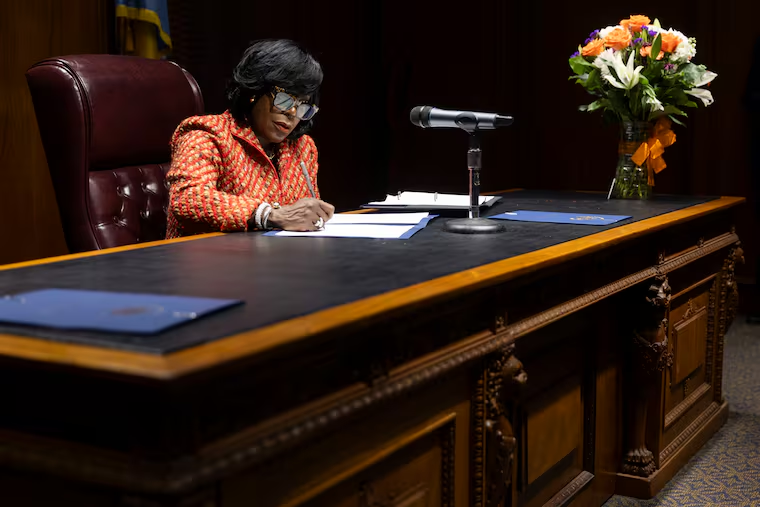We’ve finally declared a public safety emergency in Philadelphia. But why do we have to wait to act on it?
Emergencies call for urgent action, not 100 days of planning.

Mayor Cherelle Parker got a lot of people’s attention — including mine — when she declared a citywide public safety emergency just hours after being publicly sworn in as the city’s 100th mayor. It was something City Councilmember Jamie Gauthier and countless others had pushed former Mayor Jim Kenney to do in his last term as gun violence in the city soared.
The ambitious-sounding order calls on newly named Police Commissioner Kevin Bethel to work with newly named Managing Director Adam Thiel and other city department heads to deliver a plan within 100 days to hire more police officers, address violent crime, combat quality-of-life offenses, and shut down open-air drug markets. Bethel, the order states, should employ “any lawful means necessary to abate the public safety emergency.”
But considering community activist Jamal Johnson nearly starved during a 26-day hunger strike outside of City Hall in 2021 in hopes of moving Kenney to declare an emergency, I thought Johnson should be the first person I spoke with about Parker’s executive order.
Any thoughts that Johnson would be pleased evaporated seconds after our conversation began.
“Tell me how that counts as an emergency when we have to wait 100 days for people who have already been in and around this city and its problems for years to come up with a plan,” Johnson said.
Welcome to The AOP Club, friend. We “articulators of problems” — as Parker referred to people who question the city’s progress in addressing its most intractable challenges — meet weekly. The Wawa coffee is plentiful, if lukewarm.
Johnson, who, in collaboration with Philly Truce, held a monthslong Operation Hug the Block neighborhood watch program last year, often gets a bad rap for being hypercritical of the city’s anti-violence efforts. But I’ve always viewed him more as an equal opportunity thorn in the side of both city officials and his fellow activists.
Philadelphians deserve more than incremental progress, Johnson argues, so let’s not pat ourselves on the back for relatively modest developments like the 20% reduction of homicides — from 516 in 2022 to about 410 last year (the final figure is still being tabulated) — that was viewed as a “Mission Accomplished” moment in way too many circles.
“That still leaves a lot of families grieving for their loved ones, a lot of neighborhoods in fear,” Johnson said.
Look, I don’t mind that Parker declared this emergency — at least not yet. Though I do worry that between her committees and timetables and roundtables and T.S.A. leadership structure, she might delegate herself out of any accountability. Collaboration is good, but it can also lead to a bottleneck of bureaucracy.
Parker has proudly said she’s filled her administration with people who “don’t need a GPS to find 52nd Street.”
Fantastic. So then why do two veteran city officials need so much time to come up with a plan? Bethel, our new police commissioner, worked for 29 years in the city’s Police Department before retiring in 2016, spending much of the last four years serving as chief of school safety for the School District of Philadelphia. Thiel, our new managing director, has served as the city’s fire commissioner since 2016; he was also the director of the city’s Office of Emergency Management from 2019 to 2022.
Even if they don’t already have a plan they could implement yesterday — which I doubt — I have it on good authority that there are similar reports for a “safer community” currently collecting dust all over City Hall.
Did any of those road maps and blueprints work? While many might argue that some did, the definitive answer lies in our still obscenely high shooting and homicide rates.
Kenney, for one, was adamant that declaring a public safety emergency was pointless — that it wouldn’t make a difference in outcomes or resources, and that his administration was already doing all it could. Others argued declaring an emergency is just a ceremonial move that gives residents a false sense of security.
Kenney’s approach was a significant departure from that of his predecessor. After being sworn in as the city’s 98th mayor, Michael Nutter, in his first official act, signed an executive order declaring a crime emergency. That measure called for then-Police Commissioner Charles Ramsey to develop a plan within 30 days. (We do love our reports and plans in this city.) But it also sent a clear message that public safety was priority number one, and by 2013, Philly marked the lowest murder rate in Philadelphia since 1967.
When Kenney dug his heels in over not declaring an emergency, he missed a chance to give the residents of this city a simple concession: an acknowledgment from the highest levels that the daily carnage too many Philadelphians are living with is unacceptable, unforgivable, and must be urgently addressed in ways both small and large every day.
And that urgency requires immediate action. Not more plans.